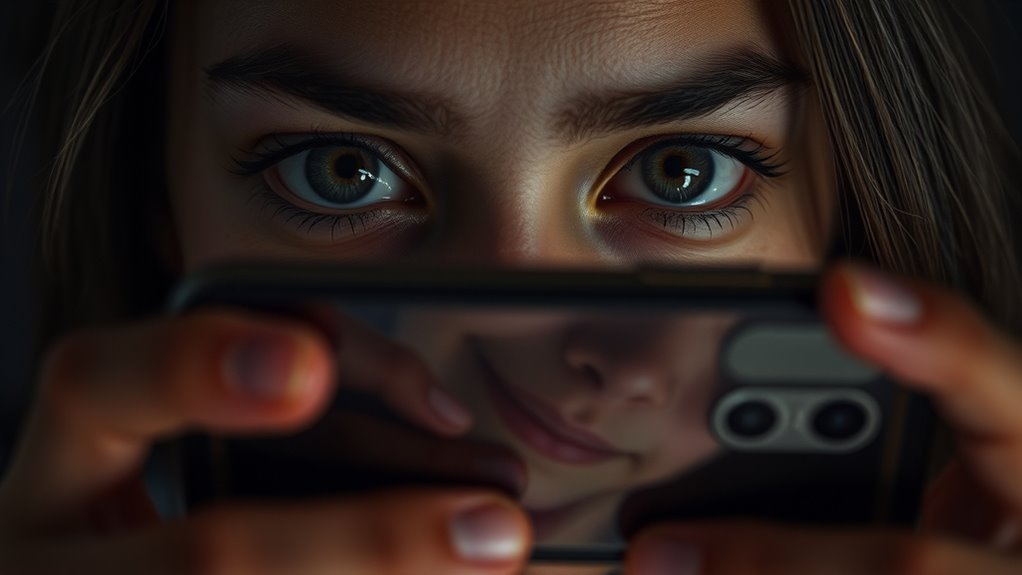AI-powered deepfake technology can make it harder for you to trust what you see in relationships, as highly realistic fake videos become more common and harder to detect. This increases suspicion, emotional pain, and the risk of deception. While tools and awareness can help you identify false content, staying vigilant is essential. If you want to understand how to protect your trust and navigate these challenges, keep exploring what lies ahead.
Key Takeaways
- Deepfakes can convincingly depict false actions or statements, eroding trust in visual evidence within relationships.
- Increased AI-generated fake content makes it harder to distinguish real from manipulated videos, heightening suspicion.
- Emotional harm from deepfakes can cause paranoia and relationship strain, even without actual deception.
- Media literacy and detection tools are essential for identifying and mitigating the impact of deepfake manipulation.
- Open communication and trust-building strategies help maintain relationship stability amid technological distrust challenges.

Have you ever wondered how realistic fake videos can now manipulate your perception of reality? With advancements in AI, deepfake technology has become incredibly sophisticated, making it harder than ever to distinguish between real and fabricated content. This development isn’t just a technological marvel; it’s a double-edged sword that raises serious concerns, especially in personal relationships. When someone you trust suddenly appears on a screen saying or doing things they never actually did, it can shake your foundation of trust. Deepfakes can be used to create convincing videos of partners, friends, or family members, suggesting infidelity, dishonesty, or misconduct. The emotional fallout from such videos can be devastating, causing unnecessary pain and suspicion based on manipulated footage.
The problem is that these videos are becoming more accessible and easier to produce, meaning anyone could potentially create a false narrative that looks authentic. It’s no longer enough to rely on your gut or visual cues alone. The line between reality and deception becomes blurry, forcing you to question what you see. This can lead to paranoia, mistrust, and broken relationships, even when no deception actually exists. You might find yourself obsessively checking messages, scrutinizing videos, or questioning your partner’s integrity, all while being vulnerable to manipulation by someone wielding deepfake technology. The emotional toll can be profound, eroding the foundation of trust that relationships are built on. Developing media literacy and critical thinking skills becomes crucial in navigating this new landscape, as understanding how these videos are created can help mitigate their impact. Recognizing the technological capabilities behind deepfakes can also help you better understand their potential for misuse and manipulation. Furthermore, understanding the creation process of deepfakes can help you develop a more skeptical and informed perspective when evaluating suspicious content. Additionally, advancements in AI are supporting detection tools that aim to identify fake videos and protect consumers from deception.
Deepfake accessibility blurs truth, fueling paranoia and mistrust in relationships. Trust becomes fragile amid manipulated images and videos.
On the other hand, these same advancements can be harnessed for positive uses, like helping to verify evidence or creating realistic scenarios for education and entertainment. But the potential for misuse is significant. Malicious actors can craft fake videos to sabotage reputations, manipulate public opinion, or even blackmail individuals. In the context of personal relationships, this means you need to be more vigilant than ever. You might start doubting your instincts, questioning every video or photo, which can intensify feelings of insecurity and anxiety. Trust, once broken or even suspected to be broken, becomes even harder to rebuild when you’re constantly uncertain about what’s real. Recognizing the importance of media literacy and understanding the technological capabilities behind deepfakes can empower you to better defend yourself against deception.
Ultimately, deepfake technology challenges your perception of truth in a way that’s deeply personal and emotional. It pushes you to develop new skills in media literacy and critical thinking. But it also underscores the importance of communication and transparency in your relationships. As AI continues to evolve, so must your ability to navigate a world where seeing no longer guarantees believing. Recognizing the importance of relationships – personality test concepts like trust and vulnerability can help you better cope with the challenges presented by this technology.
Frequently Asked Questions
Can Deepfakes Be Detected Reliably by Current Technology?
You wonder if current technology can reliably detect deepfakes. While there are sophisticated tools and algorithms designed to spot manipulated videos, none are foolproof. As deepfakes improve, so do detection methods, but some fakes still slip through. You should stay cautious, use multiple verification sources, and keep updated on the latest tools to better protect yourself from deceptive content. Trust your instincts and question suspicious media.
How Can Individuals Protect Themselves From Malicious Deepfakes?
In a world where even the most convincing deepfakes exist, you need to stay vigilant. Just like those mysterious “vaporware” tech promises of the 90s, deepfakes can deceive you if you’re not careful. Protect yourself by verifying sources, using trusted platforms, and questioning suspicious content. Keep software updated and consider tools that detect deepfakes. Staying informed and cautious helps you avoid falling victim to malicious videos.
Are There Legal Consequences for Creating or Distributing Deepfakes?
You might wonder if creating or sharing deepfakes has legal consequences. Laws vary by country, but generally, producing or distributing malicious deepfakes can lead to criminal charges like fraud, defamation, or invasion of privacy. Tech companies and governments are increasingly cracking down on these activities. If you get involved, you risk serious legal penalties, so it’s best to stay informed and avoid engaging in the creation or spread of harmful deepfakes.
Do Deepfakes Influence Public Opinion and Political Stability?
They say a picture is worth a thousand words. Deepfakes critically influence public opinion and political stability by spreading misinformation and sowing distrust. You might find it harder to discern truth from manipulated content, which can sway votes or fuel unrest. As technology advances, it’s essential you stay informed and cautious, recognizing that what you see isn’t always what’s real. Trust in media becomes an increasingly precious commodity.
What Ethical Guidelines Exist for AI Creators Regarding Deepfake Use?
You should know that ethical guidelines for AI creators aim to prevent misuse of deepfakes. These include transparency about AI-generated content, obtaining consent from individuals featured, and clearly marking synthetic media. Many organizations advocate for responsible development, emphasizing respect for privacy and avoiding harm. As a creator, you’re encouraged to follow these principles to make sure your work doesn’t deceive or harm others, fostering trust and accountability in AI use.
Conclusion
You might worry that trusting anyone feels impossible now, but remember, genuine connections still exist beyond the digital deception. While AI can create convincing fakes, your ability to see through illusions and value honesty remains stronger. Don’t let fear close your heart—trust takes courage, but it’s worth fighting for. In a world of deepfakes, your authenticity and intuition are more essential than ever. Keep believing in real moments; they’re the ones that truly matter.









